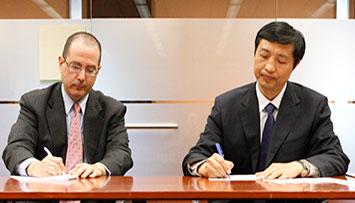Columbia Law School, Peking University Law School Expand Partnership
Deans of Both Schools Sign Memorandum of Understanding to Explore Future Opportunities for Joint Research
New York, May 10, 2013—Expanding on an already existing partnership, Columbia Law School Dean David M. Schizer and Peking University Law School Dean Zhang Shouwen have signed a memorandum of understanding that will broaden opportunities for both schools to collaborate on research and other scholarly activities.
The initiative builds on a longstanding relationship between the institutions. Since 2006, students from Beijing-based Peking University Law School have been able to study for a semester at Columbia Law School in New York’s Morningside Heights neighborhood and vice versa.
| Columbia Law School Dean David M. Schizer and Peking University Law School Dean Zhang Shouwen |
In 2011, the law schools deepened their connection, launching a faculty exchange program in which visiting professors have the option to co-teach a course with a colleague at the host institution, lecture on a topic of interest, and conduct research. Visiting faculty are also encouraged to participate in the academic life of the host school and to take advantage of campus resources and events.
The purpose of the new initiative between Columbia Law School and Peking University Law School is to enable cooperation between the schools in relation to mutually agreed upon areas of research. The schools seek to set a stage for the training of international law students and for joint academic research. Possible future collaboration includes joint publications and the hosting of joint seminars and forums.
“This partnership allows closer and more regular collaboration between Columbia scholars and their distinguished peers in China,” said Columbia Law School Dean Schizer, the Lucy G. Moses Professor of Law and Harvey R. Miller Professor of Law and Economics, after the ceremony on May 6. “Peking University Law School is one of the world’s great law schools, and a potent force for legal development in China,” Schizer added.
Dean Zhang Shouwen noted the strong ties that have historically existed between Peking University Law School and Columbia Law School and said that the new initiative “will provide the basis for a new chapter of closer and more significant collaboration between these two leading law schools.”
Columbia Law School has a long history of dedication to Chinese legal studies. In the 1960s, it became the first school among its peers to employ a full-time faculty member specializing in Chinese law. Shortly after diplomatic relations between the U.S. and China were restored in 1979, the Law School began regular faculty exchanges with Chinese academics and practitioners. In 2006, Columbia Law School was the first American law school to launch an ABA-approved student exchange program with schools in both Shanghai and Beijing, including Peking University Law School.
Benjamin L. Liebman, the Robert L. Lieff Professor of Law and director of Columbia Law School’s Center for Chinese Legal Studies, said the new initiative will “provide a platform for deepening our scholarly collaboration with China’s leading law school.”
“We already have a longstanding and very productive collaboration with Peking University Law School,” Liebman added. “This initiative will encourage deeper collaboration between faculty at Columbia and at Peking University on important questions facing the legal systems in both countries.”
Over the years, Columbia Law School scholars have traveled to China to conduct research, serve as visiting professors, participate in conferences, and advise on developing new laws. Hundreds of alumni and former visiting scholars have gone on to play prominent roles at leading Chinese law schools.
Peking University Law School is among the world’s great law schools in terms of faculty and student talent, academic research, and efforts to reform China’s legal system. Its scholars regularly partner with the Chinese government, with law firms, and with the business community to develop cutting-edge legal, social, and commercial policy.
